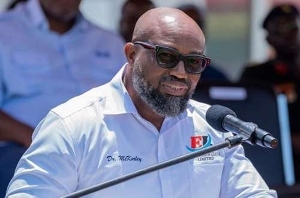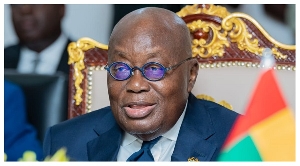- Home - Sports
- Soccer Portal
- Archived Sports News
- Sports Videos | TV
- Year In Review
- Sports Photos
- Sports Headlines
- Boxing
- Athletics
- Basketball
- Bodybuilding
- Cricket
- Golf
- Handball
- Hockey
- Martial Arts
- Tennis
- Volleyball
- Other Sports

Sports Features of Tuesday, 21 October 2014
Source: christopher opoku/footy-ghana.com
All hail Sir Jones Attuquayefio – a living football legend
On Saturday, former Ghana forward Cecil Jones Attuquayefio turned 70. The former CAF Champions League winning coach has been battling with throat cancer for a while and that has kept him out of the limelight over the last couple of years or so, but without a doubt, this is one of Ghana’s living legends.
Jones Attuquayefio was born on October 18 1944 and he came to the attention of national team selectors whilst turning out for Real Republicans in the early sixties.
Together with the likes of Osei Kofi and Frank Odoi, he played for the Academicals and following Ghana’s elimination at the quarterfinals of the 1964 Olympic Games football tournament in Japan, he began to represent the Black Stars.
As a fresh faced 21-year old, Attuquayefio scored twice as Ghana thrashed the then Congo-Leopoldville 5-2 in the Group phase of the 1965 African Nations Cup and he was thus part of the squad that won the trophy by beating hosts Tunisia in the final.
He then moved to Great Olympics, following the disbanding of Real Republicans in 1966 and that was the start of a long love relationship with the ‘Oly Dade’ boys.
He inspired the club to win the Ghana league title in 1970, by which time he had represented Ghana in two further African Nations Cup tournaments; in 1968 and 1970 and each time Ghana finished second.
His goals took Great Olympics to the 1971 African Champions Cup semifinals, before elimination by then defending champions Asante Kotoko. He suffered a serious injury during the second leg in Kumasi and even though he played on for three more years, he never really recovered his old form after that game.
He became the head coach of Great Olympics in 1974, after helping the club win the league title again that year, and held that position for 10 years. Towards the end of his reign, he became the Vice Chairman of the Ghana Football Association in 1982; a position he held for two years. Attuquayefio also won the FA cup with Great Olympics in 1983.
After working with various national teams, he had a stint in La Cote D’Ivoire, but it was in Obuasi that his tactical skills came to the fore. He won the 1994 and 1995 Ghana League titles with Obuasi Goldfields and laid the foundation for then assistant, Herbert Addo to take the team to the CAF Champions League final in 1997.
Attuquayfio became the head coach of the Black Starlets and with a team that contained the likes of Michael Essien, Stephen Oduro, Michael Osei and Bernard Dong Bortey, he won bronze at the 1999 FiFA Under 17 World Cup in New Zealand. By then he had taken over at Hearts of Oak and won two league titles already.
2000 was undoubtedly a year of crowning glory for the head coach, who had overseen a building of one of the greatest Hearts of Oak teams in recent times.
Under his tutelage, the club reached the final of the CAF Champions League and secured a 2-1 win over Esperance in Tunis despite the sending off of Amankwaa Mireku.
A 3-1 win in the second leg in Accra saw Hearts of Oak crowned African champions and it also saw Attuquayefio voted Coach of the year on the African continent.
He also guided the club to Super Cup success with a 2-0 win over Zamalek. He was asked to handle the Black Stars and after a 1-3 loss to Liberia at home in a World Cup qualifier, he famously used a team made up virtually of Hearts of Oak players and drew 0-0 with a star-studded Nigeria in Accra.
He left Hearts of Oak for a stint with Liberty Professionals, after which he was named the head coach of the Benin national team.
Attuquayefio guided Benin to its first ever African Nations Cup tournament in Tunisia in 2004 and returned for one last hurrah with Hearts of Oak.
He was in charge when Hearts of Oak defeated archrivals Asante Kotoko to win the inaugural Confederations Cup in early 2005.
He was made the Black Meteors head coach but failed to qualify the team for the 2008 Olympics, but that proved a small blot on a distinguished career.
Even though this is coming a little late, Attuquayfio must be celebrated as one of Ghana’s living legends and at 70, he needs to be remembered, not only as one of Ghana’s best players, but also one of the nation’s greatest ever coaches.










